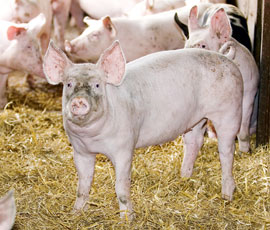Pig margin feed price challenge continues

UK pig producers’ margins remain under pressure despite finished pig returns holding at relatively similar levels.
The latest GB Euro Deadweight Adjusted Pig Price (to 28 August) is quoted at 150.35p and spot bacon pigs are also trading within the 148 -152p/kg range.
A year ago the DAPP was at 152.34p, but then the euro was worth 88p compared with 78.9p today.
A weaker euro has effectively given imported pigmeat a 12% price advantage when compared with the UK product and is quoted by meat processors as one of the reasons why it has been difficult to persuade the retail sector to increase its prices to help reduce the losses caused by spiralling feed costs.
Ex-farm feed wheat is currently trading at £178/t and the London feed wheat futures quotes are also painting an expensive picture for producers with November at £188.50/t on Wednesday (8 August) and March through to May 2013 between £195t and £199/t.
A survey by the National Pig Association shows pig producers representing more than 70% of Britain’s weekly pig output will cease production within the next 12 months unless pig prices rise and/or feed costs fall to stem existing losses.
Thirty-five percent of these suppliers believe they will have to start culling their sows before Christmas unless the situation changes.
According to the British Pig Executive the average breeder/finisher needs a deadweight price equivalent to 170p/kg to match feed costs at a time when compound grower rations are costing more than £300/t and finisher rations £260/t or more.
The soaring cost of soya caused by the US drought has also added to producers’ burden of costs with soya now traded on a spot basis up to £440/t compared with just £270/t a year ago.
On a more positive note, pigmeat prices in some European countries have started to improve, especially in the key German market where deadweight pig quotes have risen by an estimated 10p/kg over the past two weeks.
A return to better weather would not only help domestic pigmeat demand but also allow the stop-start harvest to gather momentum and provide more feed-quality wheat, although reports of fusarium mould are causing concern and will affect yields in parts of the country due to prolonged wet weather during the growing period.
Livestock 2012
Feed will be up for discussion at Livestock 2012. Find out more about the event on our dedicated page.
